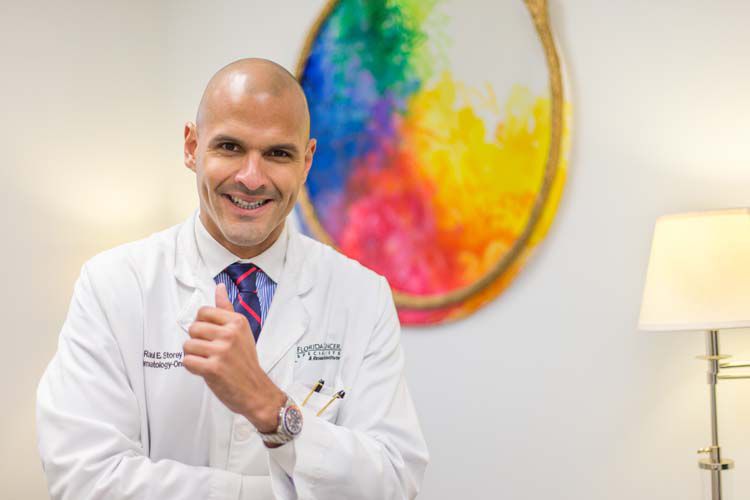
There might not be a more passionate – yet practical – advocate for cancer screening anywhere than Florida Cancer Specialists’ Dr. Raul Storey.
Maybe that passion comes from the fact that this particular oncologist and hematologist’s own father was diagnosed with cancer at age 55 but – thanks to screening and treatment – the senior Storey is still alive and well and going strong today at age 75.
While the American Cancer Society estimates more than half of all cancer deaths could be prevented if people adopted routine cancer prevention measures, including regular screenings, the ever-practical Storey freely admits, “It is important to keep in mind that screening tests can have potential harms as well as benefits, and it is important for people to discuss those potential harms as well as the benefits with their doctors.”
That – in no way – means Storey is opposed to cancer screenings. It’s quite the opposite, in fact. However, with over 100 different types of cancer out there, some screening tests, he says, are simply better than others.
Storey quickly points to colonoscopies for colorectal cancer, mammograms for breast cancer, PAP smears for cervical cancer, and the relatively recently approved low-dose CT scans for lung cancer as being among the most helpful and useful screening tests available.
At the other end of the scale, Storey confides, “There are some types of leukemias or lymphomas that even though [screening might] pick them up early, it doesn’t matter because those cancers tend to be indolent and people don’t die from them.”
Storey is fully aware of the emotional toll a cancer diagnosis can bring.
“Cancer,” says the tall, athletic Storey, “is a type of disease that affects all sides of your life. It affects your beliefs, your family and your moral values. It’s like a hurricane that not only affects the patient, it also affects the patient’s family and friends. It affects everything.”
Storey also insists that any discussion of cancer screening must also broach the topic of risk factors.
According to the National Cancer Institute, anything that increases the chance of developing cancer – including a previous bout with some form of the disease along with family history or genetic predispositions, gene mutations, exposure to certain chemicals and toxins, tobacco use, diet, exposure to radiation and even direct sunlight, obesity, alcohol use and various forms of chronic inflammations – can all be counted as risk factors.
But there’s a big cancer curveball here.
Having one or more of those risk factors does not mean that someone will get cancer and – equally importantly – not having any of the above risk factors does not preclude someone from developing cancer.
Perhaps that’s why Storey is adamant that every cancer screening patient should engage in thorough and detailed conversations with their physician both before and after any test.
Those tests include physical exams, imaging studies and blood tests as well as biopsies and procedures such as the colonoscopies, mammograms, PAP smears and low-dose CT scans mentioned above.
Of course, as a practicing, board-certified oncologist and hematologist, Storey can’t help but return to his own experience in treating leukemias and lymphoma for a parting comment.
“This is a good time for oncology and hematology,” says Storey. “This is a great, great time to treat cancer.”
He points to newer and more effective treatment options as well as a massive increase in the number of FDA-approved drugs coming onto the market.
Dr. Raul Storey is with Florida Cancer Specialists in Vero Beach at 3730 7th Terrace, Suite 101. The phone number is 772-581-0528.



